- Python Basic Programs
- Python Program Examples
- Python Print Hello World
- Python Get Input from User
- Python Add Two Numbers
- Add Subtract Multiply Divide
- Python Check Even or Odd
- Python Check Prime or Not
- Python Check Alphabet or Not
- Python Check Vowel or Not
- Python Check Leap Year or Not
- Check Reverse equal Original
- Check Positive Negative Zero
- Python Check Armstrong or Not
- Python Check Palindrome or Not
- Python Check Perfect Number
- Python Find Reverse of Number
- Python Count Digits in Number
- Python Add Digits of Number
- Sum of First and Last Digits
- Python Product of Mid Digits
- Sum of Squares of Digits
- Interchange Digits of Number
- Python Sum of n Numbers
- Python Print ASCII Values
- Python Swap Two Numbers
- Python Swap Two Variables
- Python Fahrenheit to Celsius
- Python Celsius to Fahrenheit
- Python Display Calendar
- Python Days into Years, Weeks
- Find Largest of Two Number
- Find Largest of Three Number
- Python Print Fibonacci Series
- Generate Armstrong Numbers
- Python Make Simple Calculator
- Python Add Binary Numbers
- Binary Number Multiplication
- Python Mathematical Programs
- Find Sum of Natural Numbers
- Find Average of n Numbers
- Python Print Multiplication Table
- Print Table using Recursion
- Python Find Average Percentage
- Python Find Grade of Student
- Find Square Root of Number
- Python Print Prime Numbers
- Find Numbers Divisible by
- Python Find Factors of Number
- Python Find Factorial of a Number
- Python Find HCF & LCM
- Python Kilometres to Miles
- Python Find Area of Square
- Python Find Area of Rectangle
- Python Find Area of Triangle
- Python Find Area of Circle
- Python Find Perimeter of Square
- Find Perimeter of Rectangle
- Python Find Perimeter of Triangle
- Find Circumference of Circle
- Python Simple Interest
- Python Solve Quadratic Equation
- Python Different Set of Operations
- Python Display Powers of 2
- Python Find nCr & nPr
- Python Pattern Programs
- Python Print Pattern Programs
- Python Print Diamond Pattern
- Python Print Floyd's Triangle
- Python Print Pascal's Triangle
- Python List Programs
- Python Count Even/Odd in List
- Python Positive/Negative in List
- Python Even Numbers in List
- Python Odd Numbers in List
- Python Sum of Elements in List
- Sum of Odd/Even Numbers
- Python Element at Even Position
- Python Element at Odd Position
- Python Search Element in List
- Python Largest Number in List
- Python Smallest Number in List
- Python Second Largest in List
- Python Second Smallest in List
- Python Insert Element in List
- Python Delete Element from List
- Python Multiply Numbers in List
- Swap Two Elements in List
- Python 1D Array Program
- Python Linear Search
- Python Binary Search
- Python Insertion Sort
- Python Bubble Sort
- Python Selection Sort
- Remove Duplicates from List
- Python Reverse a List
- Python Merge Two List
- Python Copy a List
- Python Conversion Programs
- Python Decimal to Binary
- Python Decimal to Octal
- Python Decimal to Hexadecimal
- Python Binary to Decimal
- Python Binary to Octal
- Python Binary to Hexadecimal
- Python Octal to Decimal
- Python Octal to Binary
- Python Octal to Hexadecimal
- Python Hexadecimal to Decimal
- Python Hexadecimal to Binary
- Python Hexadecimal to Octal
- Python Matrix Programs
- Python Add Two Matrices
- Python Subtract Two Matrices
- Python Transpose Matrix
- Python Multiply Matrices
- Python String Programs
- Python Print String
- Python Find Length of String
- Python Compare Two Strings
- Python Copy String
- Python Concatenate String
- Python Reverse a String
- Python Swap Two Strings
- Python Uppercase to Lowercase
- Python Lowercase to Uppercase
- Python Check Substring in String
- Python Count Character in String
- Count Repeated Characters
- Python Count Word in Sentence
- Python Count Each Vowels
- Python Capitalize Character
- Python Capitalize Word in String
- Python Smallest/Largest Word
- Remove Spaces from String
- Remove Duplicate Character
- Remove Vowels from String
- Remove Punctuation from String
- Python Remove Word in String
- Python Remove Duplicate Words
- WhiteSpace to Hyphens
- Replace Vowels with Character
- Replace Character in String
- Python Sort String in Alphabetical
- Sort Word in Alphabetical Order
- Extract Number from String
- Python Check Anagram Strings
- Python File Programs
- Python Read a File
- Python Write to File
- Python Append Text to File
- Python Copy Files
- Python Merge Two Files
- Python Counts Characters in File
- Python Count Words in File
- Python File Content in Reverse
- Python Lines Contains String
- Python Delete Line from File
- Python Capitalize Word in File
- Python Replace Text in File
- Replace Specific Line in File
- Python Find Size of File
- Python List Files in Directory
- Python Delete Files
- Python Misc Programs
- Python Reverse a Tuple
- Python Merge Two Dictionary
- Python bytes to String
- Python bytearray to String
- Generate Random Numbers
- Python Print Address of Variable
- Python Print Date and Time
- Python Get IP Address
- Python Shutdown/Restart PC
- Python Tutorial
- Python Tutorial
Python Program to Convert Octal to Hexadecimal
In this article, I've created some programs in Python, to convert octal number entered by user to its equivalent hexadecimal value. Here are the list of programs:
- Octal to Hexadecimal using List and while Loop
- Using String and while Loop
- Using int() and hex() Methods
- Using user-defined Function
- Using Class
Note - Before creating these programs, if you're not aware about steps used for the conversion, refer to Octal to Hexadecimal Steps and Formula to get every required things.
Octal to Hexadecimal using List and while Loop
To convert octal to hexadecimal number in Python, you have to ask from user to enter an octal number, then convert that number into its equivalent hexadecimal value. The question is, write a Python program to convert octal number to hexadecimal using list and while loop. Here is its answer:
print("Enter the Octal Number: ") octnum = int(input()) chk = 0 i = 0 decnum = 0 while octnum!=0: rem = octnum%10 if rem>7: chk = 1 break decnum = decnum + (rem * (8 ** i)) i = i+1 octnum = int(octnum/10) if chk == 0: i = 0 hexdecnum = [] while decnum != 0: rem = decnum % 16 if rem < 10: rem = rem + 48 else: rem = rem + 55 rem = chr(rem) hexdecnum.insert(i, rem) i = i + 1 decnum = int(decnum / 16) print("\nEquivalent Hexadecimal Value is: ") i = i - 1 while i >= 0: print(end=hexdecnum[i]) i = i - 1 print() else: print("\nInvalid Input!")
Here is the initial output produced by this Python program:
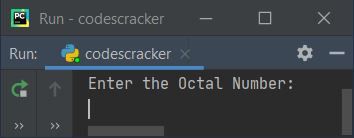
Now supply the input say 4720 as octal number and press ENTER key to convert and prints its
equivalent hexadecimal value as shown in the snapshot given below:
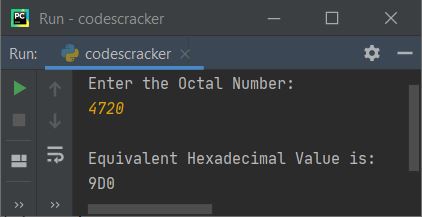
In above program, the following block of code:
while octnum!=0: rem = octnum%10 if rem>7: chk = 1 break decnum = decnum + (rem * (8 ** i)) i = i+1 octnum = int(octnum/10)
is used to convert given octal number into its equivalent decimal value. To get its in-depth working of code, refer to Octal to Decimal in Python. And the following block of code:
while decnum != 0: rem = decnum % 16 if rem < 10: rem = rem + 48 else: rem = rem + 55 rem = chr(rem) hexdecnum.insert(i, rem) i = i + 1 decnum = int(decnum / 16)
is used to convert decimal to hexadecimal. To learn its in-depth working of code, refer to Decimal to Hexadecimal in Python
Octal to Hexadecimal using String and while Loop
Now this program is created using string instead of list as used in previous program. The end= is used to skip printing of an automatic newline.
print("Enter the Octal Number: ", end="") onum = int(input()) chk = i = dnum = 0 while onum!=0: rem = onum % 10 if rem>7: chk = 1 break dnum = dnum + (rem * (8 ** i)) i = i+1 onum = int(onum / 10) if chk == 0: hnum = "" while dnum != 0: rem = dnum % 16 if rem < 10: rem = rem + 48 else: rem = rem + 55 rem = chr(rem) hnum = hnum + rem dnum = int(dnum / 16) hnum = hnum[::-1] print("\nEquivalent Hexadecimal Value =", hnum) else: print("\nInvalid Input!")
Here is its sample run with octal number input 7123:
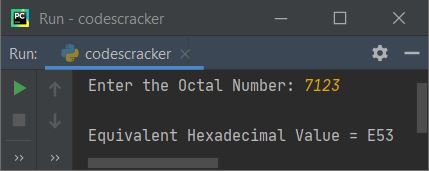
The following statement:
hnum = hnum[::-1]
states that the reverse of string stored in hnum gets initialized to hnum. That is, the string stored in hnum gets reversed.
Octal to Hexadecimal using int() and hex()
This program is created using two predefined functions namely int() and hex() to do the same job, that is of converting octal to hexadecimal. The int() returns integer equivalent of value passed as its argument. And hex() returns hexadecimal equivalent of value passed as its argument.
print("Enter Octal Number: ", end="") onum = input() dnum = int(onum, 8) hnum = hex(dnum) print("\nEquivalent Hexadecimal Value =", hnum)
Here is its sample run with user input 7302:
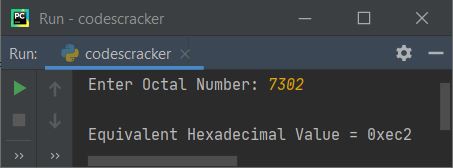
Note - To skip first two characters, and to capitalize hex digits. Replace the following (last) statement:
print("\nEquivalent Hexadecimal Value =", hnum)
with new statement as given below:
print("\nEquivalent Hexadecimal Value =", hnum[2:].upper())
Now output with same user input as provided in previous sample run, looks like:
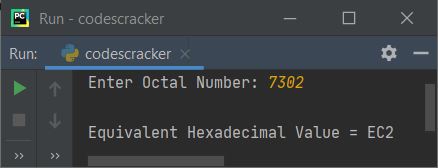
Note - To implement user-based code for lowercase to uppercase conversion, refer to Lowercase to Uppercase in Python.
Octal to Hexadecimal using Function
This program is created using a user-defined function named OctToHex(). This function receives a value (octal) as its argument and returns its equivalent hexadecimal value using int() and hex() methods.
def OctToHex(o): return hex(int(o, 8)) print("Enter Octal Number: ", end="") onum = input() hnum = OctToHex(onum) print("\nEquivalent Hexadecimal Value =", hnum[2:].upper())
Octal to Hexadecimal using Class
This is the last program created using a class and object. That is, an object ob is created of class CodesCracker. Using this object, member function named OctToHex() gets accessed using dot (.) operator.
class CodesCracker: def OctToHex(self, o): return hex(int(o, 8)) print("Enter Octal Number: ", end="") onum = input() ob = CodesCracker() hnum = ob.OctToHex(onum) print("\nEquivalent Hexadecimal Value =", hnum[2:].upper())
Same Program in Other Languages
« Previous Program Next Program »